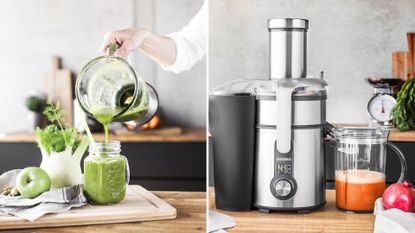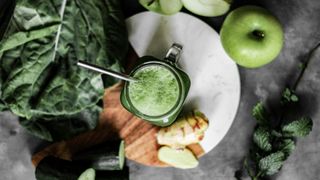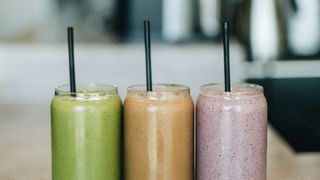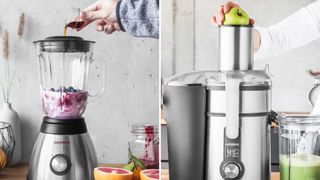Juicer vs Blender: Which is better? We explore the pros and cons of both
Curious about what's better between a juicer vs blender? We've asked the experts to find out which would suit you best

When they go head-to-head, what’s better, juicer vs blender? If you’re looking to increase the quantity of fruit and veg in your diet, both a blender and a juicer have their benefits.
The answer isn’t a simple one that’ll straightforwardly tell you that one or other of the best juicers or the best blenders are the machines you should go for. Instead, the results are a nuanced run of varying elements based on the needs of you and your households.
Consider the below more like a quiz, where you get to know the differences and weigh up the pros and cons of a juicer vs blender for your specific needs.
In short, blenders are great for adding more fibre to your diet, as they pulverise whole fruits and veggies, while juices extract the liquid from them for nutrient-dense drinks which are great for a speedy breakfast that you can take with you on the go.
To help make your decision as easy as possible, we spoke to tech experts, health professionals and chefs for their guidance and top tips.
Juicer vs blender: what is the difference?
While the two machines might seem similar, when it comes to a juicer vs blender weigh-in, the gadgets do have quite different results. Yes, both crush fruits and vegetables into drinks, but the results vary thanks to the processes used.
Juicer: Juicers squeeze, crush or grind the pulp from the liquid in fruits and vegetables to produce a mostly clear liquid. People typically love a juicer for helping to quickly and easily get more healthy foods into their diet. With a juicer, you’re left with most of the vitamins and minerals, plus the plant chemicals found in the whole ingredients. Some people believe that it’s easier for your body to absorb the nutrients in this way, although the Mayo Clinic notes that this “usually isn’t so.” Marcus Lux from Gastroback adds that “juicers also tend to have different attachments to blenders to get the most out of the juice.”
Sign up for the woman&home newsletter
Sign up to our free daily email for the latest royal and entertainment news, interesting opinion, expert advice on styling and beauty trends, and no-nonsense guides to the health and wellness questions you want answered.
Blenders: Blenders come in a few different shapes and sizes. The classic countertop kind is the type we’ll be comparing here but other machines include a mini blender - like the NutriBullet Blender Combo we reviewed, for instance - and a stick blender or one of the best hand blenders can be useful for doing jobs like whizzing up soups without having to pour the liquid out of the pot and into another receptacle. As their name suggests, blenders blend ingredients, typically using rotational blades at the bottom of a jug. This ability to crush whole fruits and vegetables means the fibre is kept intact, resulting in thicker smoothies and also more diversity in terms of achievable jobs, as you can use blenders to puree soups, whizz up sauces and more.
When pitted against a juicer to make drinks, Sandra Duncan, experience manager at Sage Appliances, says that “blenders create a thick mixture which offers versatility in the kitchen; a blender will retain fibre, creating a more substantial beverage.”

Juicing is a great way to bulk up your fruit and veg intake
What is better, juicing or blending?
“Juicing and blending both have their benefits so it’s not a one or another sort of situation," says Julia Harvey, director of operations at holistic wellness company Bodyism. "If you are looking to increase your intake of fruits and vegetables then juicing offers a good way to cram in a lot of ingredients in just one glass, as it removes the fibre and pulp from fruit and vegetables and so slims down their footprint, so to say."
"At Bodyism, we also add in our plant-based food supplement powders, which are great mixed into both juices and smoothies for an extra boost of minerals and antioxidants.”
Below we take you through the pros and cons of each, so you can make a decision based on your personal needs.
Benefits of juicers
- They can assist in upping your produce intake: Juicers are specifically designed to strip the liquid from fruits and veggies - the part which contains most of the nutrients - and so can be helpful if you’re trying to include more fresh food in your diet. One juice can include multiple portions of your five-a-day, making it easy to hit an intake target.
- They can help with a low-fibre diet: Juicing strips out fibre from fruits and vegetables, so is great if you’re on a low-fibre diet for one reason or another. Some people need a low-fibre approach if they have certain conditions like difficulty digesting food or are recovering from intestinal surgery.
- They aid in getting a great source of vitamins and minerals: Juicing can bolster your vitamin and mineral intake if you’re adding juice to your diet regularly, alongside your usual five-a-day intake. Sandra Duncan says that “nutrients are highly concentrated and absorb faster when juicing.”
Cons of juicers
- They're one-dimensional: Juicers only do one job, and that's juice. If you want a kitchen gadget that can make drinks and more, then a blender might be for you.
- They're more admin: Juicers typically come apart into lots of small pieces, which can make cleaning and storing them a bit of a challenge, which is something to consider before you invest.

Smoothies are quick and easy to make, and help add fibre into your diet if you're struggling to eat enough
Benefits of blenders
- Some can crush ice: “Some blender models can crush ice, but you’ll have to check the model you have or are buying to be sure it has a strong enough motor and in some cases an ice-specific setting,” explains w&h's food director Jen Bedloe.
- Blenders offer differing speeds: You’ll find that most blenders have various settings, which means you can vary the speed of your machine depending on what you’re looking to whizz up. Blending more slowly might retain more texture, for instance, while a quick pulse is great for dips. Turning things up a notch will result in a lovely smooth consistency, perfect for things like smoothies or even quick recipes like pancake batter.
- Blenders are easy to clean: When it comes to cleaning, we all want an easy life. Typically blenders are easier to clean than juicers, as they come apart into fewer sections. If you already own one, you might like our guide on how to clean a blender in just a few simple steps. Following our how-to each time will keep your machine well-maintained, helping to prolong its life.
- They save you a lot of time: There’s nothing like a shortcut when it comes to kitchen tasks, and a blender will help you speedily get through jobs that might take a lot longer when done manually, like chopping.
- They're able to mix dry ingredients: If you’re making something that requires you to mix a lot of dry ingredients, like homemade hot chocolate powder for instance, your blender will become your best friend. Simply tip everything in, give it a couple of pulses and you’ll have a perfectly blended dry mix.
- They offer fibre retention in recipes: “Fibre retaining is a main pro of using a blender which is essential for digestive health” comments Sandra, adding that fibre “helps regulate blood sugar levels.”
- Blenders are super versatile: Sandra goes on to say: “Blenders are also very versatile and can be used for a wide range of recipes including smoothies, soups and sauces - a very valuable kitchen tool.”
Cons of blenders
- They can be noisy: There’s no getting around the fact that blenders are noisy gadgets. They emit a buzz as they work, so it’s worth working out how much sound your chosen model will generate, and weighing up whether you can live with the trade-off (we’d be inclined to think it’s well worth it).
- You have limited control on speeds: Blenders typically don’t have as much control as a food processor, for jobs that require a level of texture. Think salsas or a sofrito base for a Bolognese. Instead, you tend to get a pretty smooth finished texture.
- Not everything can be blended: There are things you should never put in a blender, to avoid damaging the blades.

Both juicing and blending can give great health benefits when used properly
Juicer vs blender: what is healthier?
There isn’t a right or wrong answer when it comes to smoothies or juices being healthier for you. As mentioned above, juices allow you to pack in loads of nutrients in one glass, as they strip out the flesh and pulp of fruit and vegetables. On the other hand, smoothies allow you to keep all that good fibre in your diet, by blitzing everything together.
Rose Fooks, w&h’s deputy food editor suggests a blender might be more helpful if you’re deciding between the two machines. “Blenders are multi-functional, so offer much more diversity in terms of kitchen practicality. You can make batters, blend soups and bring together smoothies in minutes in a blender, whereas a juicer is pretty much made to do one job, and that’s juice."
"You can make juice from a blender by passing the mixture through a fine sieve or cheesecloth, but it’s not a practical process if you’re looking to regularly drink juice. I’d suggest investing in a blender first and foremost - if you’re a keen cook and will use it for other jobs in the kitchen - and add a juicer at another time if you find yourself drinking lots of juice, a point where you know you’ll get good use out of it “
Rosie Conroy is a food and drinks journalist with over a decade of experience working for big-name titles in both print and online. Formerly the Digital Food Editor of woman&home, Rosie went on to head up the team at SquareMeal, reviewing the best London restaurants and hunting out emerging culinary trends. With previous experience in food styling and recipe development, Rosie knows what to look for in a good piece of kitchenware and has extensive experience testing consumer goods—from kitchen electricalz and cooking accouterments through to new foodie treats.
-
 Kate Garraway spreads Christmas joy with rainbow checkerboard dress and pink heels
Kate Garraway spreads Christmas joy with rainbow checkerboard dress and pink heelsKate Garraway's patterned jumper dress reminded us that fabulous festive outfits can also be so cosy and comfortable
By Emma Shacklock Published
-
 Drew Barrymore says she ‘struggled so much’ mentally with perimenopause, revealing her unexpected symptoms
Drew Barrymore says she ‘struggled so much’ mentally with perimenopause, revealing her unexpected symptomsDrew Barrymore has opened up about the mental toll perimenopause has taken on her, explaining the barrage of symptoms she's been hit with since entering this phase.
By Lucy Wigley Published